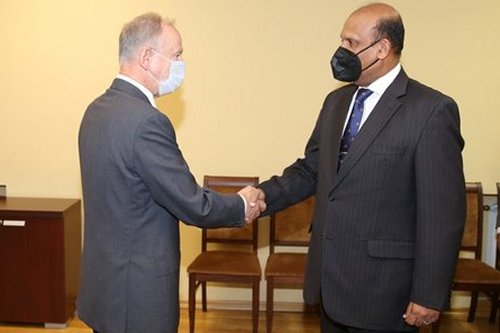
Secretary of the Security Council, Nikolai Patrushev, met with Sri Lanka’s Defence Minister, Kamala Gunarnte, in Moscow and pledged to enhance security ties between the two countries.
Earlier this year, Russian Foreign Minister, Sergey Lavrov, visited both India and Pakistan marking Russia’s increasing interest in South Asia. During his visit to India, Larov did not meet with Prime Minister Modi with reports circulating that India was not happy that the trip was tied to a visit to Pakistan. Another theory suggests that Washington had urged New Delhi to not have Modi meet with Larov.
Whilst India has maintained a cordial relationship with Russia and even discussed expanding its security collaboration, there has been growing tension given Russia’s close ties to adversarial powers in the region.
Russia’s South Asia policy
Writing in Foreign Policy magazine, C. Raja Mohan, director of the National University of Singapore’s Institute of South Asian Studies, highlights that over the past few years India has been frustrated by Russia close partnership with Beijing and tilt towards Pakistan and the Taliban.
Whilst India had continued its support for the now-ousted government of Afghanistan, Russian had repeatedly emphasised the need to engage in discussions with the Taliban and even had invited them to Moscow. This is despite continuing to label the Taliban as a terrorist organisation.
Tension grew worse as Moscow excluded India from the troika peace process which was set up in 2019 to negotiate a settlement in Afghanistan. The original participants in this process were the United States, Russia, and China however it expanded this year to include Pakistan.
Moscow defended its decision to exclude India by arguing that the country had little influence with the Taliban and would therefore not be able to contribute to the peace process.
Whilst Russia is yet to declare an official position towards the Taliban, Mark Simakovsky, a non-resident senior fellow at the Washington-based Atlantic Council has stated that Russia’s priority is to fill the vacuum left by the US withdrawal and “try to cash in on this relationship that they’ve had with the Taliban going back years”.
He further claimed that Russia hoped “to use this Taliban victory to showcase the weakening of U.S. global power and to use that to further undermine U.S. interests around the world.”
Testing QUAD
Russia’s increasing role in South Asia comes as India faces increased security risks in the region. In June of last year, 20 Indian soldiers were killed in a border dispute with China in the Himalayan region. Earlier this year, alarm was further raised as Sri Lanka granted permission to China to build three renewable energy plants on islands just off the Jaffna Peninsula and around 50km from Tamil Nadu.
In combatting China’s growing aggression in the South China sea, the Quadrilateral Security Dialogue Alliance’s (referred to as QUAD) was re-established in 2017. QUAD is an informal strategic forum between the United States, Japan, Australia, and India that is maintained by semi-regular summits, information exchanges and military drills between member countries.
Both China and Russia have criticised the military pact with Lavrov slamming the arrangement as an attempt by the West to “restore the unipolar model of world order” and to subordinate “Russia and China”.
Sri Lanka in turn has expressed scepticism over the arrangement with Sri Lanka’s Foreign Secretary asking, “do we really need QUAD”?
Read more here.
